| Srl | Item |
| 1 |
ID:
133233
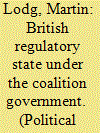

|
|
|
|
|
| Publication |
2014.
|
| Summary/Abstract |
What have been the effects of coalition government on the British regulatory state? This article argues that the politics of regulation have been largely about a continuation of existing patterns, namely volatile stability rather than more far-reaching change. The British regulatory state continues to be defined by boundary conflicts between the world of 'politics' and 'regulation', by conflicting calls for centralisation and decentralised autonomy, and by tensions between the wish to 'reduce' regulation and the realisation of inherent complexities.
|
|
|
|
|
|
|
|
|
|
|
|
|
|
|
|
| 2 |
ID:
105871
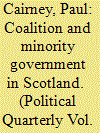

|
|
|
|
|
| Publication |
2011.
|
| Summary/Abstract |
The United Kingdom general election result in 2010 produced a hung or balanced parliament for the first time in over three decades. Since the United Kingdom has limited postwar experience of this outcome, it is natural that commentators have begun to look elsewhere for lessons on the practicalities of minority and coalition government. This article considers the lessons we can learn from the Scottish parliamentary experience since 1999. It outlines two main points of comparison: strength and stability. One might assume that coalition provides more of both than minority government. Indeed, for that reason, it is rare for central or devolved governments in the United Kingdom to operate as minorities through choice. Yet, the Scottish experience shows that the differences between coalition and minority government are not completely straightforward. Much depends on the institutional context and, in many cases, idiosyncratic elements of particular systems. Consequently, one can identify a trade-off in comparative analysis: as the identification of elements specific to one system increases, the ability to draw clear meaningful lessons decreases.
|
|
|
|
|
|
|
|
|
|
|
|
|
|
|
|
| 3 |
ID:
105872
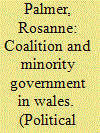

|
|
|
|
|
| Publication |
2011.
|
| Summary/Abstract |
Post-devolution Wales has had experience of a variety of different types of government and a variety of different parties in government; single party rule with one party gaining an overall majority of the seats (Labour, 2003-05), minority administrations (Labour, 1999-2000, 2005-07) and coalitions between Labour and the Liberal Democrats (2000-03) and Labour and Plaid Cymru (2007 to date). This article explores the experiences of both minority and coalition government in Wales, focusing most notably on the convoluted process of coalition formation in 2007, before proceeding to draw lessons for the United Kingdom coalition government based upon developments in Wales.
|
|
|
|
|
|
|
|
|
|
|
|
|
|
|
|
| 4 |
ID:
138279
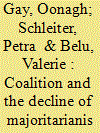

|
|
|
|
|
| Summary/Abstract |
The United Kingdom has traditionally featured many aspects of the majoritarian model of democracy: its first-past-the-post electoral system tends towards producing single-party majorities, while its legislative decision rules concentrate policy-making power in the hands of the resulting single-party governments. However, in an unprecedented break with the UK's postwar conventions, the Conservatives and Liberal Democrats formed a coalition following the general election of 2010. In this article, we examine some of the Coalition's impacts on governing and constitutional conventions, placing them in a comparative European context. We conclude that the Coalition reflects a shift towards the less majoritarian forms of politics prevalent in continental Europe, and that some of these changes are likely to persist even after the end of the current government.
|
|
|
|
|
|
|
|
|
|
|
|
|
|
|
|
| 5 |
ID:
068145
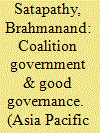

|
|
|
| 6 |
ID:
116082
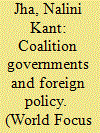

|
|
|
| 7 |
ID:
114812
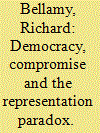

|
|
|
|
|
| Publication |
2012.
|
| Summary/Abstract |
Coalitions are often condemned as undemocratic and unprincipled because of the compromises they involve. Politicians are accused of betraying the commitments they made during the election. Paradoxically, proponents of this view suggest that if compromises are to be made they should be pragmatic and based on policy rather than principle. This article disputes this thesis and defends compromise as both principled and democratic. The first section distinguishes a shallow compromise based on the maximal satisfaction of exogenously defined preferences from a deep compromise resulting from reasoning on principle, and argues it proves impossible to avoid the latter. The second section suggests that the obligation to compromise forms part of the ethos of democracy, whereby citizens must agree despite their disagreements. The third section concludes by showing that while representatives will almost certainly betray their electoral mandate if obliged to make only shallow compromises, they can legitimately engage in deep compromises for their voters when they reason as they do.
|
|
|
|
|
|
|
|
|
|
|
|
|
|
|
|
| 8 |
ID:
115471


|
|
|
| 9 |
ID:
105873
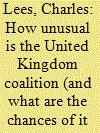

|
|
|
|
|
| Publication |
2011.
|
| Summary/Abstract |
This article draws upon insights from theoretical and empirical studies of coalition behaviour in multiparty politics to examine the formation of the United Kingdom coalition following the general election of 6 May 2010. It argues that the formation of the Conservative-Liberal Democrat coalition is not unusual in historical terms or in the context of contemporary European politics; and that although it is a break from the more recent pattern of postwar British politics it nevertheless does conform to expectations in the light of the coalition literature. The article also provides a comparative analysis of the impact of Britain's 'First-Past-The-Post' (FPTP) electoral system on party competition and an examination of the performance of the Alternative Vote (AV) system and argues that if the United Kingdom retains FPTP then a return to single-party government in 2015 is highly likely; and it is not inevitable that the introduction of AV would significantly advantage the Liberal Democrats.
|
|
|
|
|
|
|
|
|
|
|
|
|
|
|
|
| 10 |
ID:
150244
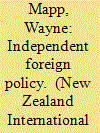

|
|
|
| 11 |
ID:
138278


|
|
|
|
|
| Summary/Abstract |
The Coalition took office in 2010 in what seemed to be a relatively benign foreign policy environment. Since then, the international environment has become far more treacherous and the government has considered war on humanitarian grounds on three occasions. In light of the silence of early Coalition documents on humanitarian intervention, together with the two parties’ different positions on the issue, this article assesses the extent to which the Coalition has adopted a distinctive approach to humanitarian intervention. In so doing, it evaluates the relative importance of Conservative and Liberal Democrat traditions in determining the direction of Coalition foreign policy. The article also considers whether there are other, more pertinent factors driving foreign policy, and offers an explanation for its relative isolation from coalition tensions. It concludes by reflecting on the likely future of humanitarian intervention after the May 2015 general election.
|
|
|
|
|
|
|
|
|
|
|
|
|
|
|
|
| 12 |
ID:
138276
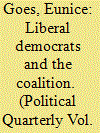

|
|
|
|
|
| Summary/Abstract |
When the Liberal Democrats joined the Coalition government in May 2010, there was an expectation that they would have a restraining effect on the Conservatives, particularly in the area of European politics. But after almost five years as the junior party in the Coalition, the Liberal Democrats struggle to demonstrate their influence over the government's approach to Europe. Not only did they let the Conservatives lead the Coalition's European agenda, but they will be forever associated with the government that brought the UK closer to the exit door of the European Union. The article argues that this outcome is the result of a series of avoidable if surprising mistakes, such as the choice of ministerial portfolios and the party's attitude to the Coalition's monitoring mechanisms, as well as some unavoidable mistakes that could have not been foreseen when the Coalition was formed.
|
|
|
|
|
|
|
|
|
|
|
|
|
|
|
|
| 13 |
ID:
120454
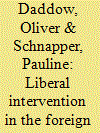

|
|
|
|
|
| Publication |
2013.
|
| Summary/Abstract |
David Cameron was a critic of Tony Blair's doctrine of the 'international community', which was used to justify war in Kosovo and more controversially in Iraq, suggesting caution in projecting military force abroad while in opposition. However, and in spite of making severe cuts to the defence budget, the Cameron-led Coalition government signed Britain up to a military intervention in Libya within a year of coming into office. What does this say about the place liberal interventionism occupies in contemporary British foreign policy? To answer this question, this article studies the nature of what we describe as the 'bounded liberal' tradition that has informed British foreign policy thinking since 1945, suggesting that it puts a distinctly UK national twist on conventional conservative thought about international affairs. Its components are: scepticism of grand schemes to remake the world; instinctive Atlanticism; security through collective endeavour; and anti-appeasement. We then compare and contrast the conditions for intervention set out by Tony Blair and David Cameron. We explain the similarities but crucially the vital differences between the two leaders' thinking on intervention, with particular reference to Cameron's perception that Downing Street needed to loosen its control over foreign policymaking after Iraq. Our argument is that policy substance, policy style and party political dilemmas prompted the two leaders to reconnect British foreign policy with its ethical roots, ingraining a bounded liberal posture in British foreign policy after the moral bankruptcy of the John Major years. This return to a pragmatic and ethically informed foreign policy meant that military operations in Kosovo and Libya were undertaken in quite different circumstances, yet came to be justified by similar arguments from the two leaders.
|
|
|
|
|
|
|
|
|
|
|
|
|
|
|
|
| 14 |
ID:
121638
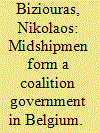

|
|
|
|
|
| Publication |
2013.
|
| Summary/Abstract |
Using a role-playing simulation on government formation with pre- and posttest assessment format, I show that students developed a significantly greater capacity for precision and specificity in their answers about the process of coalition government formation in parliamentary systems; students changed their beliefs in the ability of institutional rules to causally affect the process of coalition government formation in parliamentary systems; and, finally, students, changed their views on whether office-seeking politicians are more successful than policy-seeking politicians in forming coalition governments in parliamentary systems.
|
|
|
|
|
|
|
|
|
|
|
|
|
|
|
|
| 15 |
ID:
122483
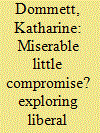

|
|
|
|
|
| Publication |
2013.
|
| Summary/Abstract |
At the half way point of the UK coalition government attention is turning towards the general election, with both parties beginning to contemplate their electoral strategies. This article explores the predicament faced by the Liberal Democrats who, unlike their coalition partners the Conservatives, saw a dramatic decline in support soon after entering government. By exploring a collapse in trust, an apparent identity crisis, and the party's questionable influence, this article seeks to explain the Liberal Democrats' current polling situation and highlight the serious barriers to retaining, yet alone extending their constituency of voters at the 2015 general election.
|
|
|
|
|
|
|
|
|
|
|
|
|
|
|
|
| 16 |
ID:
086686
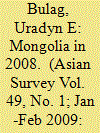

|
|
|
|
|
| Publication |
2009.
|
| Summary/Abstract |
In 2008 Mongolia witnessed the first violent riots in the wake of parliamentary elections since the country became a democracy in 1992, but the crisis was mitigated by the formation of a coalition government. Mining has become a key factor for defining Mongolia's domestic politics and international relations.
|
|
|
|
|
|
|
|
|
|
|
|
|
|
|
|
| 17 |
ID:
090128


|
|
|
|
|
| Publication |
2009.
|
| Summary/Abstract |
Nepal has entered a new round of political contention with the resignation of the Maoist-led coalition government on 4 May 2009. The breakaway coalition partners led by the Communist Party of Nepal (Unified Marxist-Leninist) (CPN UML) have forged a new coalition of 22 political parties.
|
|
|
|
|
|
|
|
|
|
|
|
|
|
|
|
| 18 |
ID:
122880
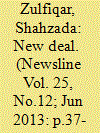

|
|
|
| 19 |
ID:
117904
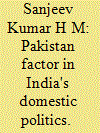

|
|
|
|
|
| Publication |
2011.
|
| Summary/Abstract |
Overt acquisition of nuclear weapons capacity by India and Pakistan in May 1998 signalled a tectonic shift in the nature of subcontinental conflicts. India's military superiority in the region and its strategic depth got considerably weakened due to Pakistan's attainment of strategic parity vis-à-vis India. In the wake of overt nuclearisation, the logic of nuclear deterrence in subcontinental security dynamics was also questioned because of continued security instability, evident in instances like the military impasse of 2001-2002. Hence, the subject of nuclearisation of subcontinental security began to capture wider spaces in the political debates in India. This strategic decision, having been taken by a coalition government, imparted enormous complexities to the domestic political exchanges over the security dynamics of the subcontinent. It also drastically transformed the nature and content of India's domestic politics, as it brought strategic issues and foreign policy agenda of the government into the political parlance of the common people.
|
|
|
|
|
|
|
|
|
|
|
|
|
|
|
|
| 20 |
ID:
117484
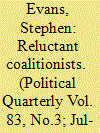

|
|
|
|
|
| Publication |
2012.
|
| Summary/Abstract |
The Conservative party has been the real awkward partner in the Conservative-Liberal Democrat coalition government because its backbench MPs have rebelled more frequently than their Liberal Democrat counterparts since May 2010. This reflected the fact that the Conservatives were reluctant coalitionists to begin with: they would have preferred to see a minority Conservative government, they had made far too many concessions to the Liberal Democrats, they had been bounced into accepting a coalition deal by a controlling party leadership, and they had lost out on those ministerial positions now held by Liberal Democrats. There was thus no great enthusiasm for the establishment of a coalition government with the Liberal Democrats in the parliamentary Conservative party in May 2010. Conservatives merely resigned themselves to an outcome which they had been given little opportunity to influence and which David Cameron had made it very difficult for them to reject.
|
|
|
|
|
|
|
|
|
|
|
|
|
|
|
|